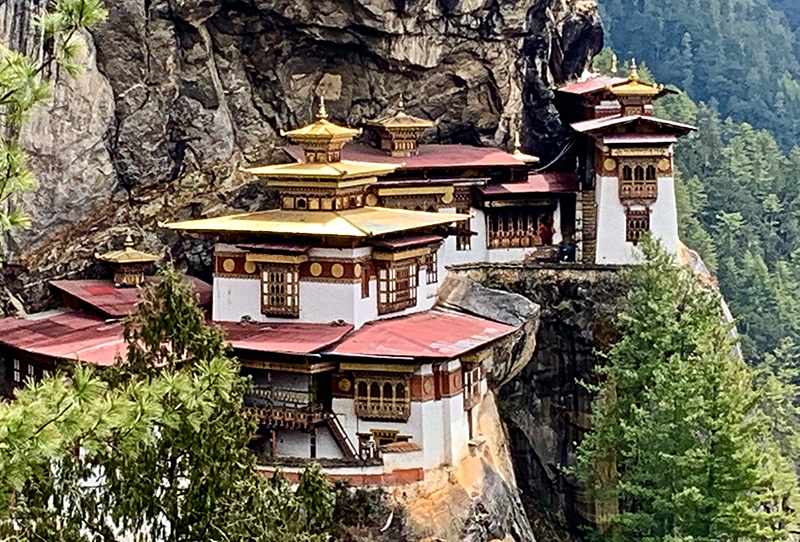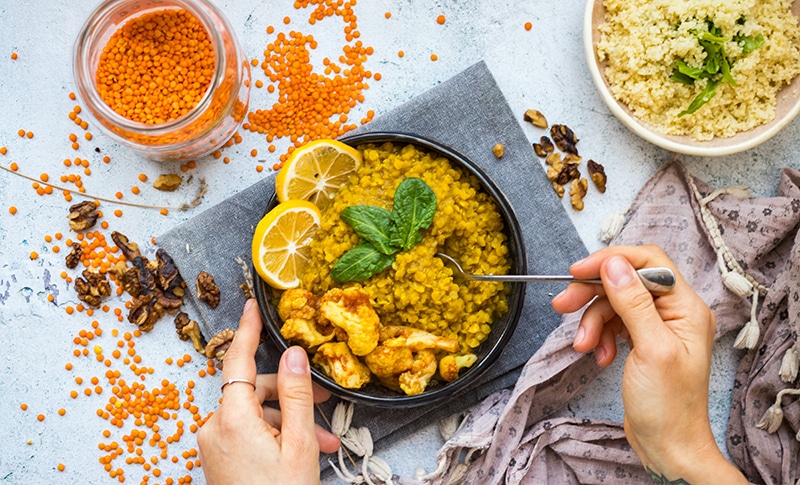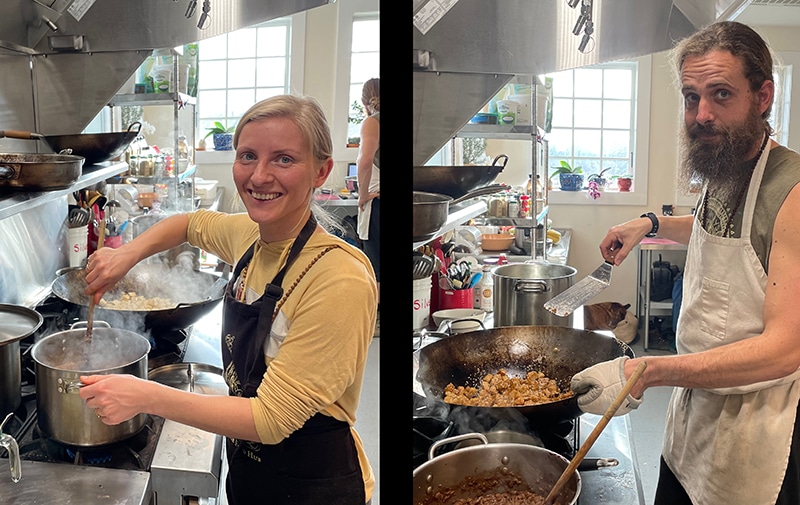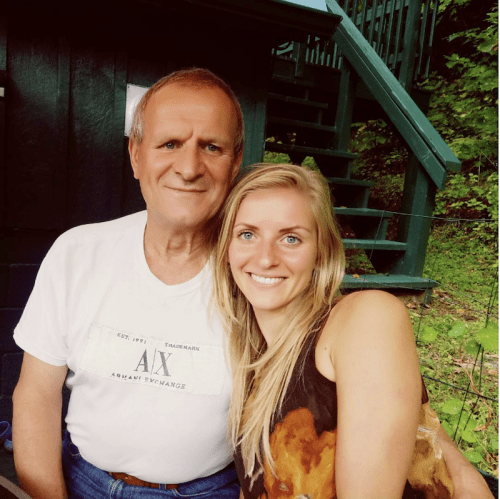A Note on Our Travels in Ukraine
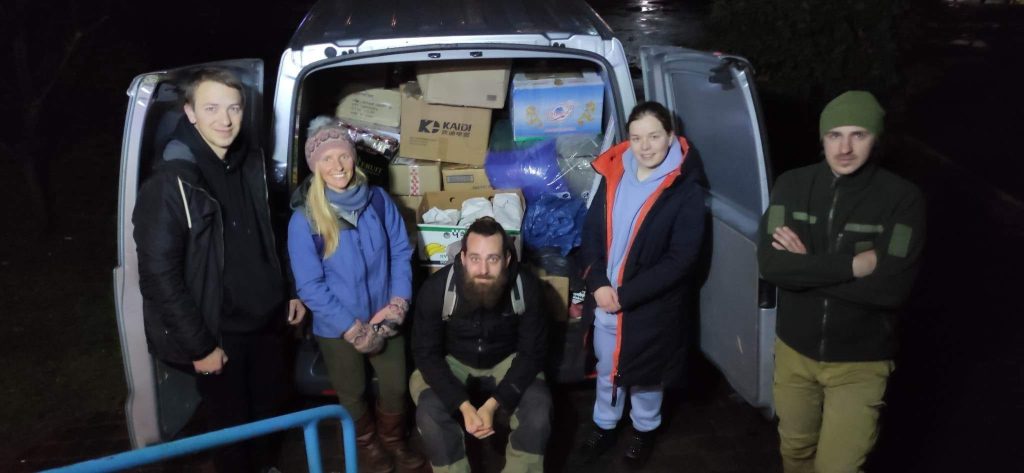
by Peter Blank, with Natalia Karaulova
Natalia and I returned from Ukraine on the 11th of January, and we thought that in lieu of a recipe this month, we could share some details about our experience there. As adventure memoirs go, it isn’t terribly exciting, but we wanted to share our perspective of the Ukrainian people and their determination to preserve their freedom.
We left from Boston, and arrived in Poland, and took a late night bus from Warsaw to Brody, which is Natalia’s home town. All civilian flights into and out of the country are grounded, and there is only one regular train service to Poland. Our bus driver, a Ukrainian, was kind enough to allow us to load all our bags without charge, and this was a trend we would see all throughout the country, that nobody thinks of themselves or their expenses when they know that what they’re handling is going to the front lines. Our bus travelled all night through Poland, and we arrived at the Ukrainian border a few hours before dawn. Both of us were so jet lagged that we drifted in an out of sleep, often seemingly on the same schedule, as one of us would wake up to peer out the window into the grey light of pre-dawn, mutter, “have we moved?” To which the other would reply, “no,” and we would fall fast asleep again. All told, we waited some seven hours to cross into Ukraine, and not without issue. A woman who chatted for a little while with Natalia was taken off the bus when she produced her Russian passport. She was Ukrainian, but like so many people, had lived and worked in Russia during the Soviet Union, and had been made to get a passport after independence to collect her pension. The military, who is now officially in charge of all executive functions of the Ukrainian government, is understandably untrustworthy of anyone with such deep ties to their enemy. We could only guess if she was able to enter the country or turned back, as she was removed from the bus by soldiers and taken inside.
At long last, the bus rumbled forward again and we were back on familiar territory: the legendarily bad back roads of Ukraine. The bus bumped and jostled and made sleep almost impossible. We entertained ourselves by admiring the snow-covered fields, little villages and forests. Ukraine, though rapidly industrialized during the Soviet era, retains an enormous amount of pre-industrial character out of simple necessity. There are thatched barns, wattle-and-daub houses and horse-drawn buggies alongside modern homes with widescreen TVs, BMWs and Teslas.
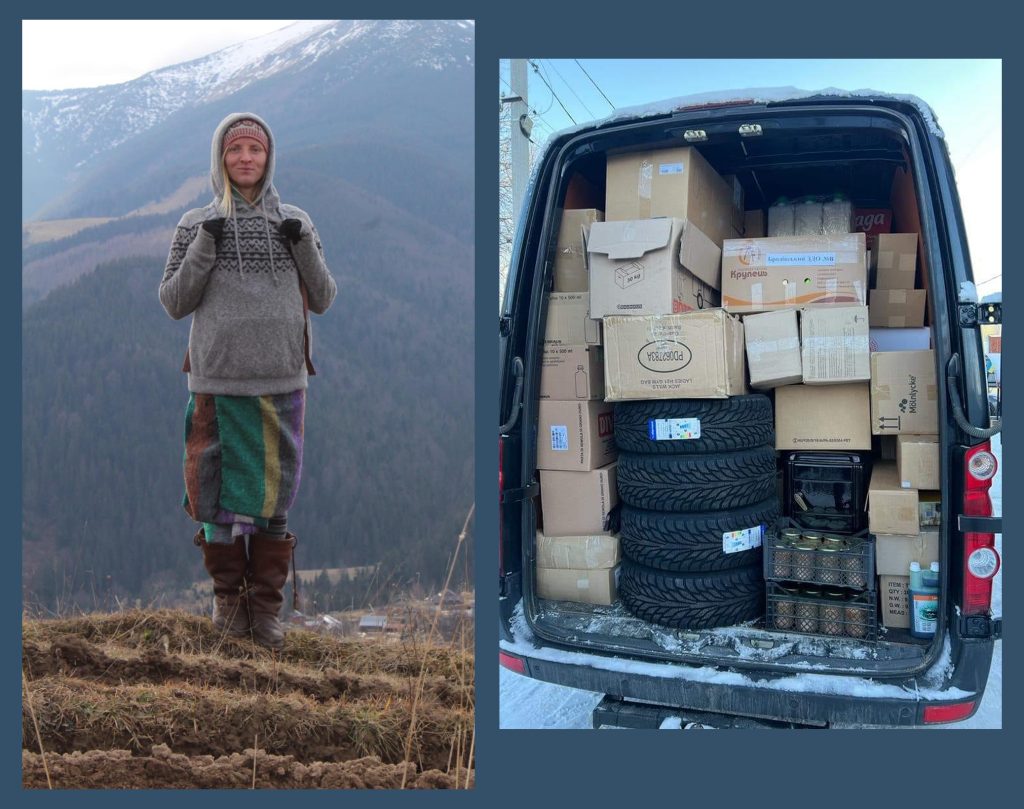
When we reached Brody, Natalia’s dad Ivan helped us load his van with our bags and drove us home. Perhaps anyone with Eastern European, or even just European family can relate, but there is a lot more to a homecoming in Ukraine than just “Hi nice to see ya.” Natalia’s grandmother (babusya is Ukrainian for grandma, but there are almost infinite variations, like Babs, Babsu, Babusu, Babusichka, etc.) had prepared a feast, and we were the guests of honor. Everyone chuckled to hear a whole new set of Ukrainian phrases I had picked up, Babusya most of all, as I think she believed me to be something like a dog or a monkey before who was only capable of mimicry. We were hugged and kissed and fed until almost bursting, then mercifully sent off to bed.
Our days after that began to blur a bit as we hustled loaded bags into and out of vans, checking things off lists, packing and repacking, and trying to get specific items where they were requested. We met up with two groups in town who were sending donations directly to the front lines. Both did so exclusively with donations or from their own pockets. Ira, who owns a shoe store with her husband Taras, had so many boxes of sauerkraut, cookies, military fatigues, sleeping bags, bulletproof vests, warm mittens, water bottles and countless other things, that there was hardly any room for inventory or customers, and she would simply point someone in the direction of what they asked for if someone came shopping.
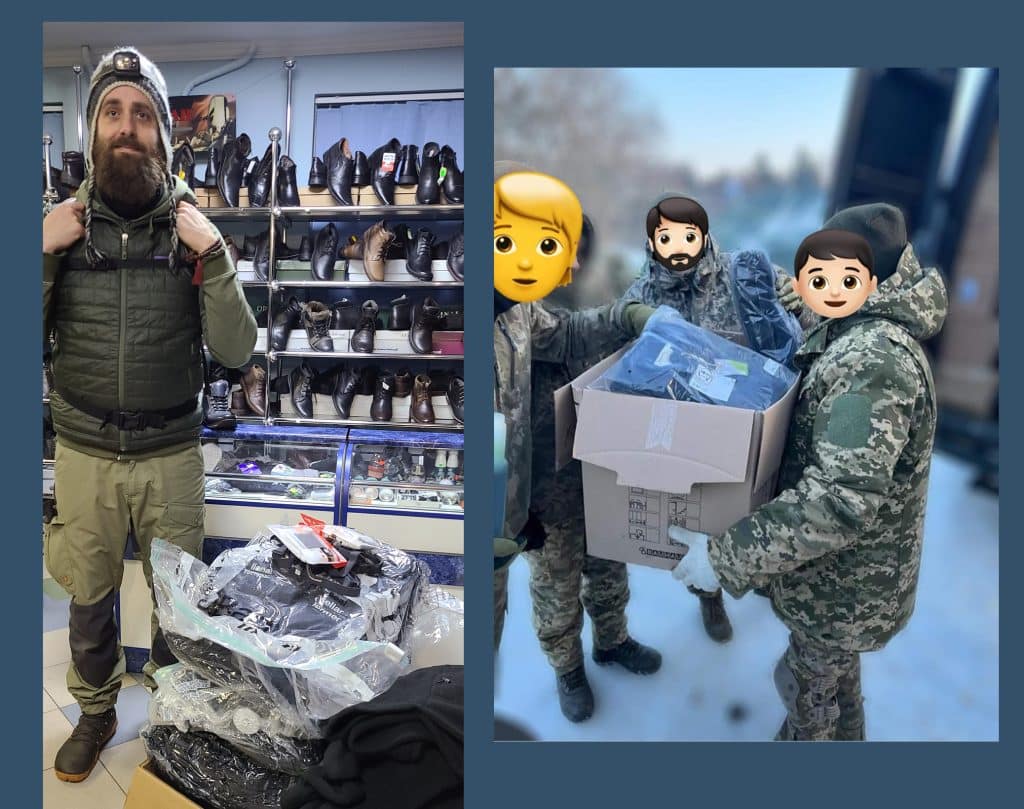
We spent some time helping Pavlo, who runs an organization called the Bee Keepers. He has a basement filled with combat aid, clothing, and emergency food items which he and his wife collect, and then weekly send to the front in a Sprinter van. His wall is adorned with Irish flags and other memorabilia from people who are sending their love along with their money and materials. On one day, we helped to unload a tractor trailer truck of supplies from Germany, and on another we spoke with a driver who had been missed by a shell by only thirty meters while on his way home from the delivering aid. We were daily reminded that these are people dying on the front, who are like us in every way, who love their families and friends, who enjoy the sunshine on a warm Spring day, but are trapped hiding in trenches and haunted by random death. Time after time, it was brought home to us the absolute useless absurdity of war, the spectacularly unnecessary waste of human potential.
We took a few days to visit Lviv, which is sort of the de facto cultural capital of Western Ukraine. It is beautiful and elegant, but beneath the surface, there is a deep well of memory and pain. Many people, including some of Natalia’s family, came to Western Ukraine during the Holodomor famines of the 1930’s, when Joseph Stalin deliberately starved millions of Ukrainians to death for the crime of resisting collectivization. Her paternal grandmother, who is no longer living, was one of those refugees, and passed down almost unspeakable horror stories of hunger and desperation.
These days, life goes on similarly to before the war, but now with anti-aircraft guns, tank traps, sandbag bunkers, blockades, and taped windows. But people adapt, skirting past ripped sand bags or broken glass, or chatting on their cellphones as soldiers check paperwork. If Russia hoped to break Ukrainian spirits with hardship, they have failed spectacularly, and in so many ways, have simply served to unite Ukrainians with common purpose and vision.
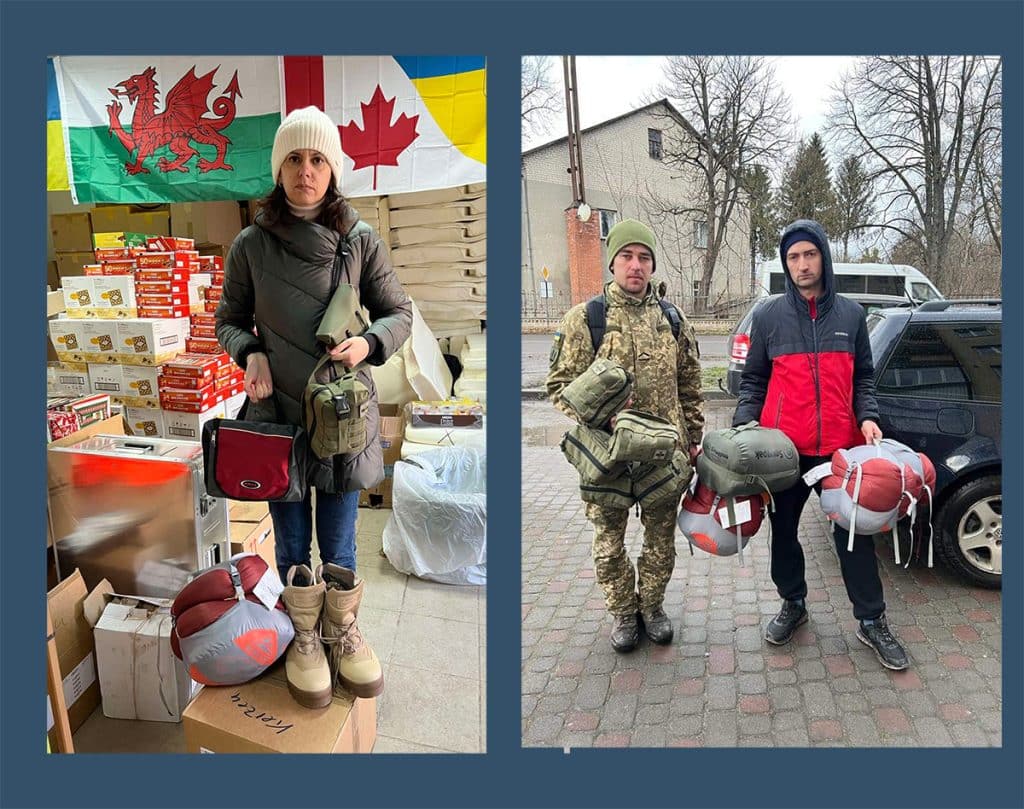
Everyone knows here what is at stake, and while some loyalties are mixed, the vast majority know that theirs is a struggle of freedom versus autocratic feudalism and cruelty. Ukraine had a similar appearance on the exterior this time, but there was something different. There was a dynamo humming in it’s heart. There are donation centers everywhere, and it seemed that nearly a twentieth or more of the people in town were soldiers. After students go home from Natalia’s grade school, her teachers stay late making trench candles to send to the front lines. Air raid sirens were a weekly, and often daily, occurrence, and yet they had become so commonplace that few people even doubled their step to avoid potential danger. There were days when helicopters would fly so low over our apartment that the windows would shake, and you could read the Cyrillic script on their bellies, while the roads leading out of town had sandbag bunkers with milk crates of old and unused Molotov cocktails. Hedgehogs, anti-tank devices made from steel beams, stretch across fields and through forests in long rows. Brody, like the rest of Ukraine, has become a single-minded entity. Russia isn’t intending to stop in the East, but to conquer all of the country, to erase Ukrainian identity and to levy them into rebuilding the Russian Empire. It might sound like hyperbole, but even a day or so of watching Russian television will put that thought to rest; nobody is pulling punches or concealing rhetoric. Putin himself insists that Ukraine and Ukrainians are a mistake that Russia intends to correct, that the West and the values of freedom and democracy are the enemies he intends to defeat, and that like Czar Peter the Great, he is simply taking back what belongs to Imperial Russia.
In conclusion, I would say this: We cannot thank everyone enough for their contributions, for their money, support and love in helping us to do this. Tyrants thrive on division, they need people to not care for others, to ignore their plight. Every penny that flows into Ukraine from the hands of ordinary citizens, every foreign fighter who comes to offer their lives to preserve Ukrainian freedom represents the existential threat that faces tyrants everywhere: that we might recognize our fundamental unity, and stand together without fear.
With love from the kitchen,
Pete and Natalia
Previous posts from Peter and Natalia on Ukraine:
https://naturaldharma.org/latest-news/support-for-natalia-and-peter-traveling-to-ukraine/
https://naturaldharma.org/latest-news/message-from-natalia-karaulova/
